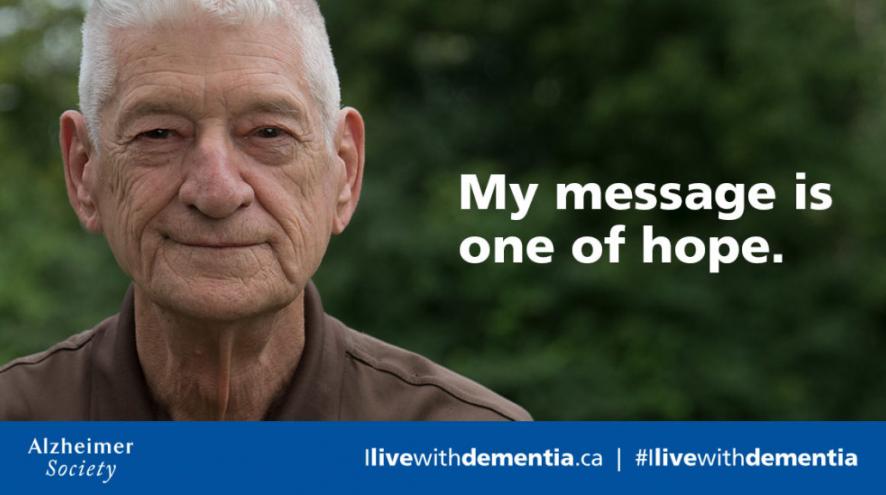Yes. I live with dementia. Let me help you understand: Ron Robert
Ron Robert, 81, lives in London, Ontario. Highly interested in politics, Ron worked as a journalist for two decades covering the British Columbia, Alberta and Saskatchewan provincial legislatures before working the western desk for then-Prime Minister Pierre Trudeau. Ron was diagnosed with Alzheimer’s disease in 2015.

My family and I are very familiar with Alzheimer’s—so my diagnosis, while upsetting, was not a complete surprise. I have two siblings who were also diagnosed with the disease. Even though there is a family history—and while I say I wasn’t completely surprised—when I look back, I can see that I was somewhat in denial. It’s only natural, I suppose.
It was devastating to have my driver’s license taken away as soon as I was diagnosed. It seemed like I was instantly not who I was before, but that wasn’t how I felt. When I met with the doctor and received the news, he didn’t say much more than the facts: that I had Alzheimer’s. I feel that the health care profession could do a better job at helping people deal with such a diagnosis. Maybe offer support and information. It would have made it a little bit less challenging.
There is a great deal of stigma around Alzheimer’s… like it’s an “old person’s” disease. It’s not. And along with the stigma around Alzheimer’s is the stigma around aging in general. I’ve heard derogatory remarks about being old, but interestingly, it’s not from young people for the most part. They seem very patient. It’s the people who are aging but not yet seniors who seem to display the highest level of stigma against senior citizens.
Learning to live with dementia
My message is one of hope. A diagnosis doesn’t mean you have to stop living your life. After I was diagnosed with Alzheimer’s, I decided I had two choices: I could give in and do nothing, or I could fight back.
I began to consider going to university, as it was on my bucket list. In preparation, I started a walking regime, about five kilometres a day to make sure I would be physically in shape. For me, the most important aspect of going to university was the testing. I complete everything that’s expected from the young students: assignments, papers, exams, etc. The other important factor was socializing with the students, staff and faculty.
I’ll admit that I was a little anxious about going to school and being with so many young students. But I learned that there are few barriers that can’t be overcome by seniors who wish to attend a university. For example, the services from the accessibility department made it possible for me to meet the usual requirements of students, such as computers and special software.
University wasn’t easy at first. In my first year at Wilfrid Laurier University in Waterloo, I went from a D in my first exam to an A in my final exam in Political Science. It was a real surprise and satisfying, mainly because of the progress it showed.
I’m now in my second year and feel better both mentally and physically. This year, I am attending King’s University College in London. I’m working on a research paper on how education can benefit people with dementia. I also plan to take another course about ageism.
Here are my tips to help you understand
- A dementia diagnosis doesn’t have to be a death sentence. Life goes on; make the most of it.
- Ageism is a big part of the stigma. Older people can still contribute to and participate in the community.
- The brain is just another muscle that needs exercise and stimulation.
Visit ilivewithdementia.ca to read more stories by people like Ron and learn more about Alzheimer’s Awareness Month.
